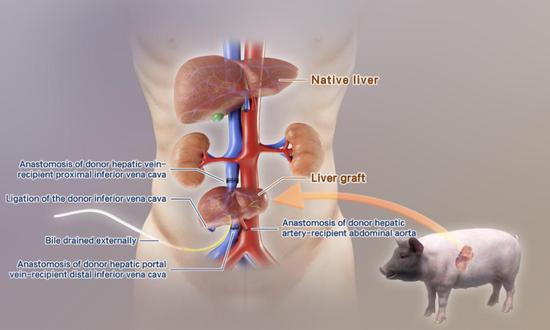
A Chinese research team has successfully completed the world’s first transplant of a gene-edited pig liver into a brain-dead human, with the organ showing good physiological function, Xinhua reported Wednesday.
Dou Kefeng, an academician at the Chinese Academy of Sciences (CAS), led a research team from Xijing Hospital and other institutions in transplanting the liver of a pig with six genetic edits into a brain-dead human whose basic bodily functions were still being maintained. The recipient’s own liver was retained to simulate support therapy for patients with clinical liver failure.
“We observed that the transplanted gene-edited pig liver can perform physiological functions in the human body, secreting bile normally, with good blood supply and pathological results,” Dou Kefeng told Xinhua. No hyperacute rejection or transmission of porcine endogenous retrovirus to humans was detected during the 10-day observation.
The study was published in Nature on March 26. The journal held an online press conference specifically for this paper, introducing it as the world’s first known successful case of transplanting a gene-edited pig liver into a brain-dead human recipient. The publication of the paper marks the recognition of the research completed last March by the international academic community. A related report on the Nature website described it as a “milestone” in the transplantation of animal organs into humans.
Peter Friend, professor of transplantation from University of Oxford commented that “This is an important study because it advances the field of xenotransplantation from non-human primates to human.” Friend said that this is a very “elegant” surgical technique, noting that “it is potentially feasible in a clinical setting as a temporary bridging technique.”
The surgical plan was reviewed by relevant academic and ethics committees and was carried out strictly in accordance with national regulations.
The recipient was a brain-dead patient with severe head trauma. The recipient’s family agreed to participated in the xenogeneic liver transplant study without compensation, contributing to medical progress. The procedure was ended after 10 days at the request of the family.
In recent years, driven by advancements in gene editing and other new technologies, xenotransplantation using pigs as organ donors has made significant progress, as pig organs are similar to human ones in size and function. Gene edits reduce risks like immune rejection.
Multiple gene-edited pig heart and kidney transplants have been reported globally in recent years. These studies may help address the worldwide challenge of organ shortages for transplantation.


















































 京公網安備 11010202009201號
京公網安備 11010202009201號